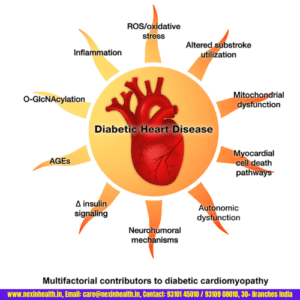Heart Attack Risk in Diabetic Patients: What You Must Know


Heart Attack Risk in Diabetic Patients: When 52-year-old businessman Rajesh Kumar from Delhi suffered a massive heart attack in 2023, his family was shocked. “He seemed perfectly healthy,” his wife told doctors. “He just had diabetes, but that was under control.” What they didn’t realize was that heart attack risk in diabetic patients is 2-4 times higher than in non-diabetics—even when blood sugar appears “controlled.”
This tragic story repeats thousands of times daily across the globe. Diabetes doesn’t just affect your blood sugar; it silently damages your heart and blood vessels, creating a deadly combination that catches many patients and families unprepared. Understanding this diabetic cardiovascular risk could literally save your life.
🚨 Eye-Opening Statistics:
Diabetes and heart disease connection goes far beyond simple blood sugar elevation. When glucose levels remain high, a cascade of destructive processes begins attacking your cardiovascular system at multiple levels.
Cardiovascular complications of diabetes occur through several mechanisms:
High blood sugar acts like tiny glass particles, scraping and damaging the inner walls of your arteries. This damage creates diabetic atherosclerosis at an accelerated pace, causing:
Read:
Diabetes and cardiovascular disease: inter-relation of risk factors and treatment
Diabetes heart disease mechanisms involve the formation of harmful compounds called AGEs. These sticky proteins:
Heart attack risk factors in diabetics create a perfect storm when combined. Understanding these diabetic cardiac risk factors helps identify your personal danger level:

Prevalence of heart disease in diabetics reveals alarming trends:
Mortality rates for diabetic heart patients show the severity of this combination:
Heart attack symptoms in diabetic patients can be dramatically different from typical presentations. Diabetic neuropathy often masks classic chest pain, leading to silent heart attacks in diabetes.
Silent myocardial infarction occurs in 20-30% of diabetic patients, making regular cardiac screening essential.
Prevention of heart disease in diabetics requires a comprehensive, multi-faceted approach. Diabetic heart disease prevention strategies include:
Optimal diabetes control significantly reduces cardiovascular risk:
Hypertension management in diabetics is crucial:
Lipid management for diabetic patients involves:
Heart-healthy lifestyle for diabetics encompasses multiple areas:
Diabetic diet for heart health should emphasize:
Physical activity for diabetic heart patients provides dual benefits:
Stress reduction techniques support both diabetes and heart health:
Treatment for diabetic heart disease varies based on individual risk factors and existing conditions:
Interventional cardiology for diabetics may include:
Regular screening for diabetic patients should include:
Heart health monitoring in diabetics may require:
Diabetic heart disease management requires personalized strategies:
Que: How much higher is the heart attack risk for diabetic patients compared to non-diabetics? Ans: Diabetic patients have 2-4 times higher risk of heart attack compared to non-diabetics. This risk increases with poor blood sugar control, high blood pressure, and other cardiovascular risk factors.
Que: Can heart attacks in diabetic patients occur without chest pain? Ans: Yes, diabetic patients often experience “silent heart attacks” due to diabetic neuropathy, which can mask typical chest pain. Watch for unusual fatigue, shortness of breath, nausea, or jaw pain instead.
Que: What HbA1c level is considered safe for heart health in diabetics? Ans: An HbA1c below 7% is generally recommended for most diabetic patients to reduce cardiovascular risk. However, your doctor may set individualized targets based on your specific health conditions.
Que: Do all diabetic patients need to take cholesterol-lowering medications? Ans: Most diabetic patients over 40 years old are recommended to take statin medications for cholesterol management, regardless of their current cholesterol levels, due to high cardiovascular risk.
Que: How often should diabetic patients have heart health checkups? Ans: Diabetic patients should have comprehensive cardiovascular assessments at least annually, with more frequent monitoring if risk factors are present or if they have existing heart disease.
Que: Can exercise be dangerous for diabetic patients with heart disease? Ans: Exercise is generally beneficial but should be supervised initially. Patients with known heart disease should undergo cardiac clearance and may need monitored exercise programs or cardiac rehabilitation.
Que: Are there specific diabetes medications that also protect the heart? Ans: Yes, certain newer diabetes medications like SGLT2 inhibitors and GLP-1 agonists have been shown to provide cardiovascular protection beyond blood sugar control.
Que: What emergency signs should diabetic patients watch for regarding heart attacks? Ans: Seek immediate medical attention for: severe chest discomfort, shortness of breath, unusual fatigue, profuse sweating, nausea/vomiting, or pain in arms, jaw, or neck.
Que: Can controlling blood sugar reverse existing heart disease in diabetics? Ans: While good blood sugar control can slow progression and reduce future risks, existing heart disease damage is usually permanent. However, proper management can significantly improve outcomes and quality of life.
Que: Should diabetic patients take aspirin daily for heart protection? Ans: Low-dose aspirin may be recommended for diabetic patients with additional cardiovascular risk factors, but this decision should always be made with your doctor considering bleeding risks and individual circumstances.
Remember, heart attack risk in diabetic patients is serious but manageable. With proper medical care, lifestyle modifications, and regular monitoring, diabetic patients can significantly reduce their cardiovascular risk and live healthy, fulfilling lives. The key is early recognition, consistent management, and working closely with your healthcare team to create a comprehensive protection strategy.
Also Read:
EECP Treatment for Heart Failure
Track Heart Failure with 6 Minute Walk Test
_____________________________________________________________________________
Mr. Vivek Singh Sengar is the Founder of Fit My Heart and a leading Integrated Health Practitioner & Clinical Nutritionist at NEXIN HEALTH and MD City Hospital Noida. With over 13 years of experience, Vivek has treated more than 25,000 patients suffering from lifestyle diseases like heart disease, diabetes, and obesity through non-invasive, drugless, and nutrition-focused therapies.
His expertise combines modern medical knowledge with traditional Indian healing practices to provide comprehensive care for heart failure patients. Vivek’s approach focuses on sustainable lifestyle modifications, nutritional therapy, and patient education to achieve optimal cardiovascular health outcomes.
Get Expert Guidance for Your Heart Health:
📧 Email: care@nexinhealth.in
📞 Phone: +91 93101 45010
💬 WhatsApp: Click to Chat
Take the first step towards better heart health today. Contact our team for personalized heart failure management plans tailored to your specific needs and lifestyle.